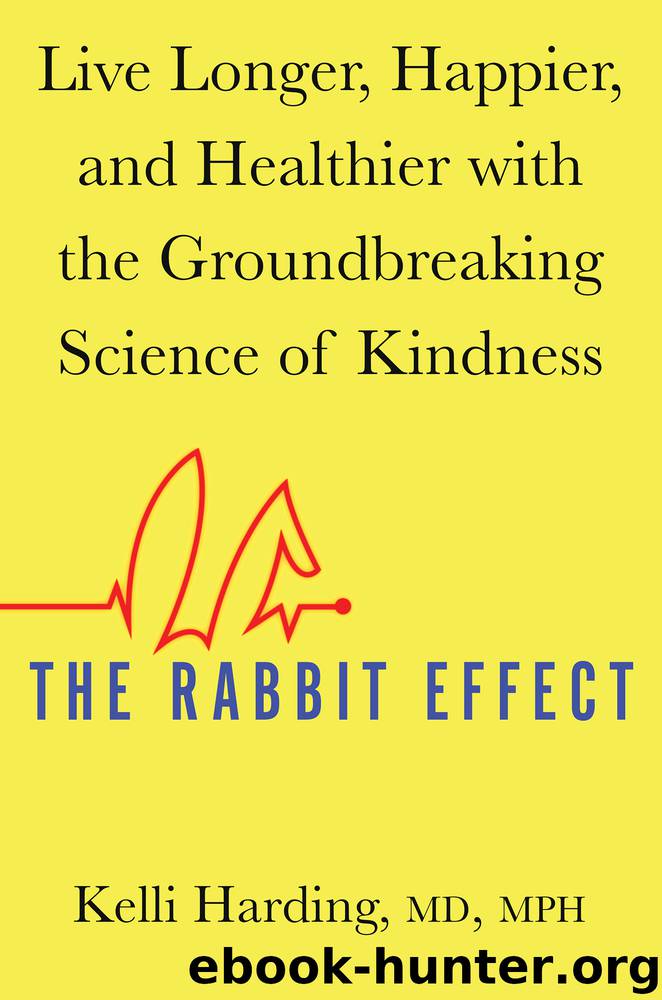The Rabbit Effect by Kelli Harding

Author:Kelli Harding
Language: eng
Format: epub
Publisher: Atria Books
Published: 2019-08-26T16:00:00+00:00
EXPAND YOUR TOOL KIT
Practicing the Golden Rule
Discussing our differences peacefully takes tremendous courage. Ignoring differences between us (i.e., acting “colorblind”) prevents us from fully being an ally for each other. If you feel you’ve been discriminated against, with whom or where might you safely discuss the situation? As we will talk about in chapter 10, there is power in groups and in sharing your story. The following are just a few ideas to start the conversation.
To boost awareness of unconscious bias, consider taking the anonymous Implicit Association Test at https://implicit.harvard.edu. Warning: It may make you think twice about your near-and-dear beliefs.
Volunteer to do an activity with people outside your usual social group. Participating face-to-face in a shared activity can make you see the world differently. Take your kids along. It is life-changing. If you have more time, consider a year of AmeriCorps, Teach For America, Senior Corps, or the Peace Corps. (See page 200 for my AmeriCorps story.)
In the organizations you belong to, what safeguards can you put in place to promote fairness in hiring or promotion or salary practices? Frame it as a health issue. For example, innovative businesses are using software (e.g., Textio) to review job postings for hidden bias on both gender and ethnicity. This software screens for a “gender tone meter,” a clever way to try to address implicit bias. (Companies like Johnson & Johnson have dramatically increased their hiring of women using such technology.)76
Support state and national initiatives for pay equality and transparency, understanding that unequal pay is a hidden health tax for all of us. (If you work in health care, check out the Time’s Up HealthCare Initiative.)
Check out strategies from the Madison approach to “break the prejudice habit.”77 Consider an evidence-based workshop for your workplace.
Tap into your own empathy reserves during challenging situations using techniques like loving-kindness meditation. (I used it this morning.) Consider taking an online or in-person guided session or class.
If you are comfortable sharing your story, post to MicroAggressions.com or peruse the posts to build your own cultural sensitivity.
If you are concerned bias may be playing a role in your diagnosis or medical care or that of a family member, ask the doctor, “What else could this be?” or “How else might his symptoms be treated?” If something feels off, please ask for a second opinion and listen to your intuition. Doctors are human too.
Part of civil discourse is calling out double standards or blatant discrimination directly. Courage to navigate conflict and developing the skill set is a huge part of kindness. (See chapter 10.)
Download
This site does not store any files on its server. We only index and link to content provided by other sites. Please contact the content providers to delete copyright contents if any and email us, we'll remove relevant links or contents immediately.
Nudge - Improving Decisions about Health, Wealth, and Happiness by Thaler Sunstein(7707)
The Fire Next Time by James Baldwin(5446)
iGen by Jean M. Twenge(5416)
Adulting by Kelly Williams Brown(4574)
The Sports Rules Book by Human Kinetics(4386)
The Hacking of the American Mind by Robert H. Lustig(4383)
The Ethical Slut by Janet W. Hardy(4253)
Captivate by Vanessa Van Edwards(3839)
Mummy Knew by Lisa James(3691)
In a Sunburned Country by Bill Bryson(3542)
The Worm at the Core by Sheldon Solomon(3487)
Ants Among Elephants by Sujatha Gidla(3467)
The 48 laws of power by Robert Greene & Joost Elffers(3291)
Suicide: A Study in Sociology by Emile Durkheim(3022)
The Slow Fix: Solve Problems, Work Smarter, and Live Better In a World Addicted to Speed by Carl Honore(3009)
The Tipping Point by Malcolm Gladwell(2922)
Humans of New York by Brandon Stanton(2873)
Get What's Yours for Medicare: Maximize Your Coverage, Minimize Your Costs by Philip Moeller(2732)
Handbook of Forensic Sociology and Psychology by Stephen J. Morewitz & Mark L. Goldstein(2705)
